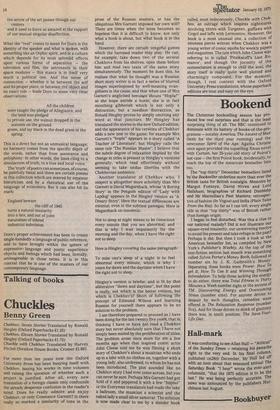Chuckles
Benny Green
Chekhov, Seven Stories Translated by Ronald Hingley (Oxford Paperbacks £1.25) Chekhov, Eleven Stories Translated by Ronald Hingley (Oxford Paperbacks £1.75) Chuckle with Chekhov Translated by Harvey Pitcher (Swallow House Books, Cromer £1.60) For more than ten years now the Oxford University Press has been busying itself with Chekhov, issuing his works in nine volumes and raising the question of whether such a project is justified. After all, every new translation of a foreign classic only confounds the already desperate confusion in the reader's mind. Does he really admire and enjoy Chekhov, or only Constance Garnett? Is there really so marked a similarity of tone in the prose of the Russian masters, or has the ubiquitous Mrs Garnett imposed her own will? There are times when the mess becomes so hopeless that it is difficult to know, not only what a book is about, but what book is in the hand.
However, there are certain vengeful games which the harrased reader may play. He can, for example, take down two of the several • Chekhovs from his shelves, open them before him and read two texts of the same story simultaneously. The moment he does this, he realises that what he thought was a Russian short story writer is in fact a series of blurred images superimposed by well-meaning evangelisers in the cause, and that when one of Mrs Garnett's anglicised heroines shouts "Hopla!" as she leaps astride a horse, she is in fact mouthing gibberish which is not only a distraction, but a needless distraction, as Ronald Hingley proves by simply omitting any word at that juncture. Mr Hingley has translated the stories in the new Oxford edition, and the appearance of his versions of Chekhov adds a new zest to the game; for example Mrs Garnett's "hopla" appears in a story called 'A Teacher of Literature', but Hingley calls the same tale The Russian Master'. I believe that the subtle degree of relaxation implied by the change in titles is present in Hingley's versions generally, which read effortlessly without seeming to take undue liberties with the Chekhovian ambience.
Another translator of Chekhov who, I suspect is altogether more scholarly than Mrs Garnett is David Magarshack, whose 'A Boring Story' in the Penguin edition of 'Lady with Lapdog' appears in the Hingley version as 'A Dreary Story'. Here the textual differences are minimal, even in the subtlest passages. Here is Magarshack on insomnia: Not to sleep at night means to be conscious every minute that you are abnormal, and that is why I wait impatiently for the morning and the day, when I have the right not to sleep.
Here is Hingley covering the same paragraph: To miss one's sleep of a night is to feel abnormal every minute, which is why I yearn for dawn and the daytime when I have the right not to sleep.
Hingley's version is briefer, and is lit, by that alliterative "dawn and daytime", but the point is really, not which is the better version, but which is Chekhov's? Short of following the precept of Edmund Wilson and learning Russian for yourself there appears to be no solution to the problem.
I am therefore prepared to proceed as I have been doing for the last twenty five years, that is, thinking I have or have not read a Chekhov story but never absolutely sure that I have not simply been misled by the proliferation of titles. The problem arose once more for me a few months ago when that inspired comic actor John Cleese told me he was filming a short story of Chekhov's about a musician who ends up in a lake with no clothes on, together with a young lady, also undressed, to whom he has not been introduced. The plot sounded like no Chekhov story I had ever come across, but you can never be sure. Perhaps Mrs Garnett had got hold of it and peppered it with a few "hoplas" or the Everyman translatois had made the lake a ballroom, the musician a scientist and the naked lady a small silver samovar. The solution is now made clear to me by a slender book


























 Previous page
Previous page